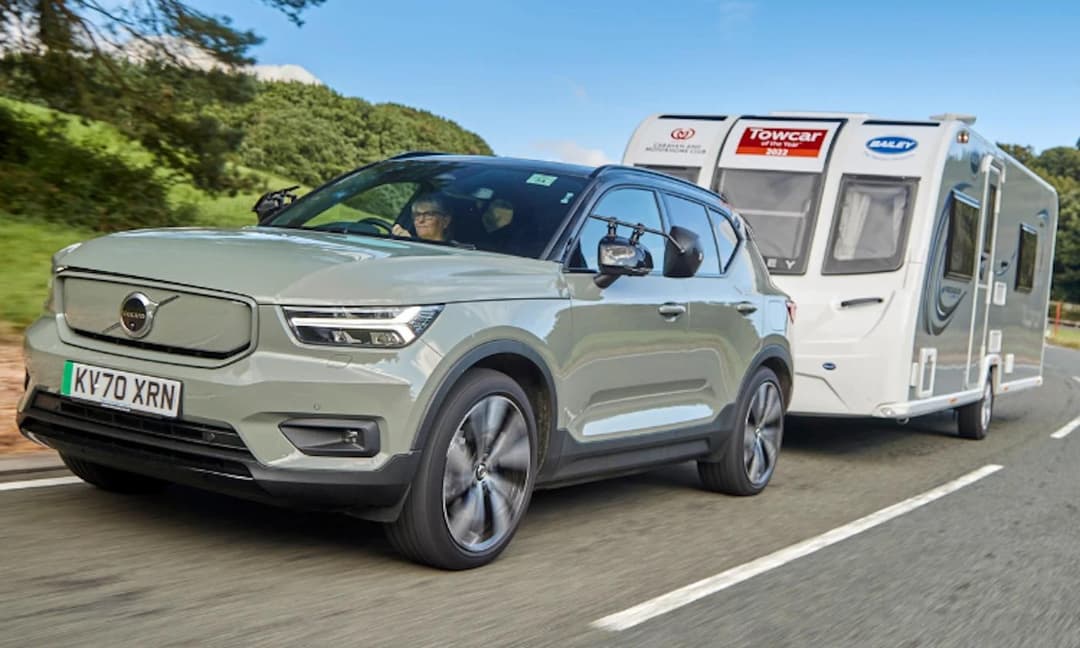
According to former Australian Prime Minister Scott Morrison, Electric vehicles "won't tow your boat, they won't tow your trailer".
While this statement is mostly untrue, the towing capacity of electric cars is sometimes more limited than its petrol equivalent. This however is dependent on the model.
The guide will cover the common questions we get asked:
- What can EVs tow
- How towing affects EV range
- The best EV for towing (for now)
Can Electric Cars Tow?
Electric Cars can absolutely tow, however, due to the weight of the batteries maximum total payload and towing capacity is sometimes less than their fuel-powered counterparts.
The average braked towing capacity of vehicles in the zecar EV database is 1,400kg and ranges from 300kg to 2,500kg. This level of towing capacity is more than sufficient to tow a range of different trailers, caravans and boats. It should be noted that nearly all the vehicles currently in the database are luxury sedans and compact SUVs, most of which are not designed with towing as a primary use in mind.
When it comes to electric utes, several models (not yet available in Australia) have very impressive rated towing capacities and compare favourably to petrol/diesel equivalents. These figures will only improve as battery technology and design principles improve for electric vehicles.
Can Electric Cars Tow a Caravan?

Electric cars can tow caravans. However, you'll need to ensure that the towing capacity (braked/unbraked) of your electric car is higher than the weight of the caravan being towed. Other factors which should also be considered include the TBM (tow ball mass) and GVM (gross vehicle mass), an in-depth review of these are however not the focus of this guide.
A small caravan with 2-4 berths can weigh between 800kg and 1.3 tonnes. Larger caravans with 4-6 berths can range from 1.3 to 1.8 tonnes in weight. Most of the EVs on the below list should have no problems towing a smaller caravan.
Based on tests conducted, towing a caravan can reduce the range of an electric car by half. Refer to the example in the next section.
Braked vs Unbraked Towing
As noted above the towing capacity of your electric car must be at least higher than the weight of the item being towed. Your car will typically have a braked and unbraked towing capacity. The tow ratings of all EVs can be viewed here.
Braked towing capacity is the maximum your vehicle can tow if the trailer you are towing has its own brakes. This figure is always almost higher than the unbraked amount.
Unbraked towing capacity is the maximum your vehicle can tow if the trailer you are towing has no brakes.
How Towing and Payload Affect Electric Car Range
Just like burning more fuel quickly, towing will significantly reduce your EV's range quicker – often cutting range in half according to some carmakers. This will have a more pronounced effect on an EV which typically has half to two-thirds the range of an equivalent petrol/diesel car.
Towing increases energy consumption and thus reduces EV range for the following key reasons:
⚖ Weight - Additional payload weight from passengers or cargo can have a detrimental impact real-world range. Towing something heavy like a trailer or caravan is likely to have the biggest negative impact on real-world range.
💨Wind-drag - Ever noticed how most electric car designs are slippery and rounded in shape? The main purpose is to increase aerodynamics (and reduce wind drag). Having a boxy trailer or caravan trailing your electric car will have an adverse effect on aerodynamics and thus range.
Carwow's Matt Watson undertook a range and towing test to find out what impact on range, mounting accessories, like a roof box or bike rack, or towing a caravan would have. The test was completed with a Skoda Enyag iV80, a medium SUV with a WLTP range of up to 528 km. The range calculations are based on the vehicle’s displayed efficiency and its battery capacity. We've summarised the results (and converted them into metric figures) of the experiment in the below table. Key highlights include:
- Carrying 4 passengers reduced range by 4%
- Carrying a bike rack reduced range by 16%
- Towing a caravan reduced range by more than half (57%)
The results from Matt's range test are broadly consistent with similar tests undertaken and advice given by several manufacturers.
Which EV Has the Highest Towing Capacity?
Based on its rated towing capacity of 2,500 kg, the BMW iX eDrive40 is the electric car with the highest towing capacity in Australia. Overseas, the Rivian R1T has the highest towing capacity of any electric vehicle. It can tow up to 11,000 pounds (5,000 kg).
Typical features of an electric car with good towing capacity include strong motors (high power and torque) and an all-wheel-drive system (dual motors or more).
Below you'll find the rated towing capacity (braked and unbraked) for every electric car.
EV Towing FAQs
About the author
Stay up to date with the latest EV news
- Get the latest news and update
- New EV model releases
- Get money savings-deal

